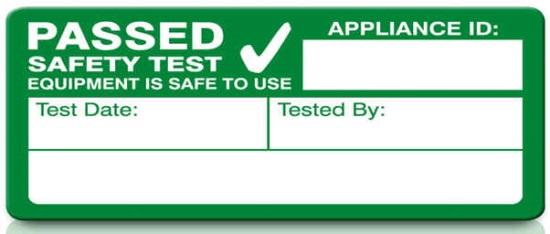Complete Powerpoint slide presentation for forklift instructors. Ready made training course
P.A.T. Portable appliance testing - all you need to know!

You may wonder what this article is doing on a forklift training website. Well I figured that many forklifts are powered by electricity and they are certainly portable so why not? My ulterior motive is to accurately describe what the law says as opposed to some of those, (rare), unscrupulous companies who try and sell you their services.
The information on this page comes courtesy of the Health and Safety Executive and is accurate for the UK as of today's date. February 7th 2022.
What is portable appliance testing?
Portable appliance testing (PAT) is the term used to describe the examination of electrical appliances and equipment to ensure they are safe to use. Most electrical safety defects can be found by visual examination but some types of defect can only be found by testing. However, it is essential to understand that visual examination is an essential part of the process because some types of electrical safety defect can't be detected by testing alone.
A relatively brief user check (based upon simple training and perhaps assisted by the use of a brief checklist) can be a very useful part of any electrical maintenance regime. However, more formal visual inspection and testing by a competent person may also be required at appropriate intervals, depending upon the type of equipment and the environment in which it is used
I've been told I must have my appliances tested every year by law. Is this correct?
No. The Electricity at Work Regulations 1989 require that any electrical equipment that has the potential to cause injury is maintained in a safe condition. However, the Regulations do not specify what needs to be done, by whom or how frequently. (ie they don't make inspection or testing of electrical appliances a legal requirement, nor do they make it a legal requirement to undertake this annually)
How frequently do I need to test my electrical appliances?
The frequency of inspection and testing depends upon the type of equipment and the environment it is used in. For example, a power tool used on a construction site should be examined more frequently than a lamp in a hotel bedroom.
Do I need to keep records of testing and should I label any appliance tested?
There is no legal requirement to label equipment that has been inspected or tested, nor is there a requirement to keep records of these activities. However, a record and / or labeling can be a useful management tool for monitoring and reviewing the effectiveness of the maintenance scheme – and to demonstrate that a scheme exists.
Do I need to test new equipment?
New equipment should be supplied in a safe condition and not require a formal portable appliance inspection or test. However, a simple visual check is recommended to verify the item is not damaged.
Is it mandatory to use an electrician?
The person doing testing work needs to competent to do it. In many low-risk environments, a sensible (competent) member of staff can undertake visual inspections if they have enough knowledge and training. However, when undertaking combined inspection and testing, a greater level of knowledge and experience is needed, and the person will need:
- the right equipment to do the tests
- the ability to use this test equipment properly
- the ability to properly understand the test results
Is Portable Appliance Testing compulsory?
No. The law simply requires an employer to ensure that their electrical equipment is maintained in order to prevent danger. It does not say how this should be done or how often. Employers should take a risk-based approach, considering the type of equipment and what it is being used for. If it is used regularly and moved a lot eg a floor cleaner or a kettle, testing (along with visual checks) can be an important part of an effective maintenance regime giving employers confidence that they are doing what is necessary to help them meet their legal duties. HSE provides guidance on how to maintain equipment including the use of PAT.
The original article covering the above points can be seen on HSE's website.
Disclaimer. The legislative information contained on this web site is my interpretation of the law based on many years in the health and safety business. A definitive interpretation can only be given by the courts. I will therefore not be held responsible for any accident/incident/prosecution arising as a consequence of anyone using any information obtained from this web site.